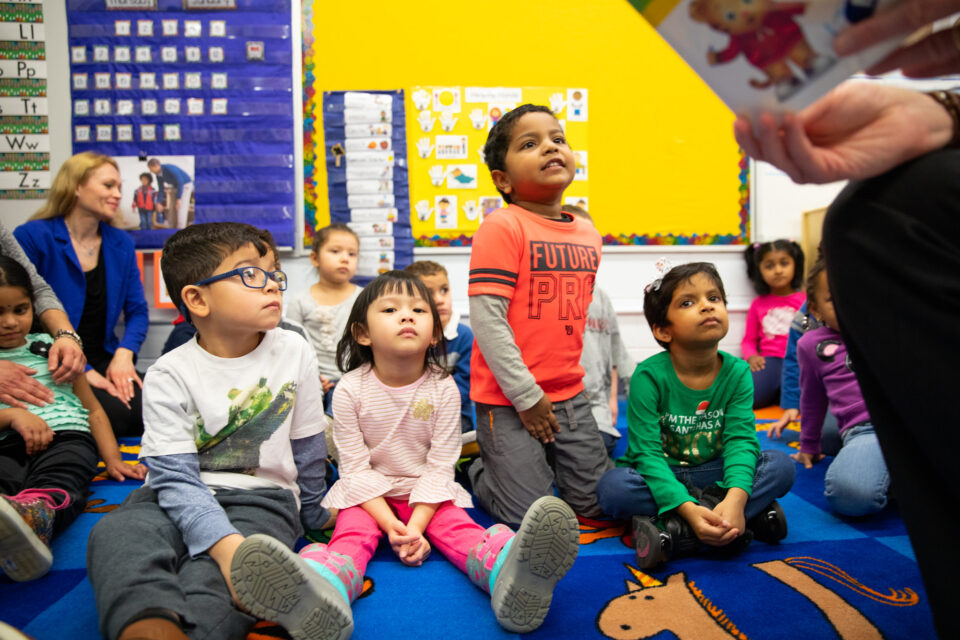
A Good Charter Approval Process = Good Charter Schools. Check Out the Videos!
November 16, 2018
Uncommon’s Camden Prep Joins Forces with Community Groups to Keeps Children Warm and Well-Fed
November 26, 2018Here’s What’s Wrong With Save Our Schools-NJ’s Answers to the DOE Charter School Survey. Or, Let Them Eat Cake.
Last week the anti-choice/accountability Princeton-based group called Save Our Schools-New Jersey summoned its Facebook members to fill out the survey that is part of the state’s charter school law review. No brain required because SOS-NJ has helpfully given supporters the answers to the survey; all they have to do is cut and paste.
There’s one problem with this convenience: the answers SOS-NJ supplies contradict best practices and distort facts. As a public service I’m providing corrections. This is easy on me too because the National Association of Charter School Authorizers (NACSA) has lots of data-driven research on what makes or breaks a charter school law. Here, then, are SOS-NJ’s answers to the DOE’s four questions, followed by my commentary.
DOE Question #1: What do you like about New Jersey’s approach to charter schools? Why?
SOS Answer: “New charter schools should be approved through a local democratic process in each community, rather than by the politically appointed Commissioner of Education in Trenton. Charter schools are funded by local property taxes and state income taxes that are taken from local public school budgets, yet taxpayers have no say over charter school creation or expansion.”
Actually, NACSA has this to say about states that limit authorizers to “a local democratic process,” which means, I assume, a referendum in each school district that has a charter application or a vote by their representatives, the local school board. The bottom line is that it’s a bad idea that is fading fast.
Greg Richmond, chief of NACSA, writes,
In 2016, school district authorizers opened 222 fewer schools than they did in 2013. While fewer new schools opened overall during this period, the drop among school districts is striking: It’s nearly 2.5 times as large as the decrease in new charter school openings under all other types of authorizers combined.
Many districts did not slow down their authorizing activity; they simply stopped. Nearly two-thirds of districts with charter schools did not authorize a single new charter school in the past four years. Conversely, 70 percent of state education agencies and independent chartering boards authorized a school in at least three of the four years examined.
Richmond see this slowing of local control as a positive development, despite the “millions of children in the United States [who] lack access to a good school that will prepare them for success in life.” He continues,
Earlier this year, our research found that the authorizers with the strongest school portfolios have an institutional commitment to charter school authorizing and see it as their mission to provide more quality options to kids. Authorizing is visible and championed within their institutional framework, not buried in layers of bureaucracy. Their day-to-day authorizing staff has meaningful influence over decision making.
These qualities are more likely to be found in authorizers like state education agencies and independent chartering boards than within school districts. It is not impossible for districts to be good authorizers — and they exist — it simply is not their core mission.
We know that districts, by far, use fewer nationally recognized authorizing best practices than any other type of charter school authorizer. In some places, districts are openly hostile to charter schools and look for any reason to decline applications.
Here’s your take-away, SOS-NJ followers: if NJ changes its law to restrict authorization of charters to local school boards or residents, charter approval and expansion will cease. (Senate President Steve Sweeney says he would never allow a local vote on charter approvals “because it would “absolutely shut down charter schools.”) Yeah, yeah, I know that’s the endgame, but let’s at least be honest about it. A “local democratic process” is a death knell for charter school expansion, as shown throughout the country.
One other thing: charter school tuition isn’t “taken from local school board budgets.” That money was never the school board’s to begin with. The money follows the child; the child doesn’t follow the money. It’s our bad that the state doesn’t distribute the money directly but uses districts as middle-men.
Zach Wright explains,
Public charter schools do not rob traditional public schools of funding, because the money does not belong to the traditional public schools in the first place. It belongs to the public, and it is meant to educate each child in the environment where they can most thrive. That money ought to follow them regardless of whatever form of public education they choose.
DOE Question #2: What would you like to improve regarding New Jersey’s approach to charter schools? Why?
SOS Answer: “Charter schools should be required to educate the same student population as local public schools. NJ charter schools do not educate as many special needs students, English Language Learners, or low income students as local public schools. This segregates those students in local public schools, while removing the resources needed to provide them with a high quality education.”
I agree! Charter schools should indeed educate the same population as traditional schools, and charter leaders know this. Our best operators like KIPP and Uncommon are steadily increasing their special education capacity.
It’s worth noting here that earlier this year SOS-NJ founder Julia Sass Rubin and her colleague Mark Weber published a paper called “New Jersey Charter Schools: A Data-Driven View – 2018 Update, Part I” (funded by an anti-charter foundation) where they address disproportionality in enrollment between public charter and traditional schools. Here’s my take:
Rubin/Weber fail to note that the DOE suppresses any data when the group of students in any category is less than 10, presumably for privacy reasons. (“Data are suppressed if cell size is 10 or less,” the DOE explains.) Charter schools tend to be small, sometimes just 200-300 kids. That means they’re much less likely to have 10 or more kids with a high-cost disability, even if their enrollment is proportionate. If they have 9 kids with autism the DOE records this as “0.” My guess is that Rubin/Weber marked those categories with zeroes (as they appear in raw data) and dragged down the charter school averages with, well, lots of zeroes. (For more on N.J. charter programs for kids with severe disabilities, see here and here.)
How about students who aren’t native speakers? Rubin/Weber write, “While the statewide charter school LEP [Limited English Proficiency] rate has increased slightly over the last decade, the rate for district public schools has increased more, widening the gap between them.”
But here’s the thing: Weber knows better! He knows that Newark’s charter schools, the biggest sector in the state, cluster in non-Hispanic neighborhoods. From a report he co-authored with his professor Bruce Baker that came out three months ago:
North Star
serves effectively no children with limited English language proficiency, in part because North Star caters to a predominantly black student population from Newark’s black neighborhoods, which remain geographically segregated from the city’s Hispanic and other ethnic neighborhoods and are home to non-English speaking families.In other words, the neighborhoods where N.J. charters cluster tend to be in Black, non-Hispanic neighborhoods. Of course they have fewer Hispanic students and, thus, fewer English Language Learners, because their enrollment reflects the neighborhoods they serve. Example: The two big charter networks in Newark are Uncommon and KIPP. KIPP’s TEAM Academy is 93.4 percent Black and Uncommon’s North Star Academy is 86.3 percent Black. Voila: very few English Language Learners.
DOE Question #3: Are there adjustments the State can make to its approach to charter schools in order to better serve students and communities?
SOS Answer: “Charter schools should be evaluated using the same criteria as local public schools. Currently, NJ charter schools are evaluated primarily on the basis of their standardized test scores and their financial solvency while local public schools are evaluated using the many criteria that make up the Quality Single Accountability Continuum (QSAC).”
Actually, this is flat out wrong. Here’s the deal with charter schools: they get more autonomy (staffing, programming, extended calendars) in exchange for higher degrees of accountability than traditional schools. And all public school students, charter and traditional, take the same state standardized tests.
Example: this year the State closed down the International Academy of Trenton. One reason was that 14.4 percent of students were chronically absent, which is twice as high as the state demands for “excelling” charter schools. Now those kids can go to Trenton Central High where the percentage of students chronically absent is 32.8 percent.
DOE Question #4: In what ways can district schools and charter schools work together to improve educational, operational, and social outcomes?
SOS Answer: “NJDOE should make data on enrollment, performance and finances of charter schools more readily available to the public, as it does with data for local public schools.”
I agree. For some reason the DOE doesn’t include charters in their School Performance Reports. They should, as well as budgets. Then people might understand that NJ charter schools get no facilities funding (a major problem with our charter school law) and that our best charters are closing the achievement gap far more swiftly than traditional neighborhood schools. (See here for an example.)
SOS-NJ has an agenda: to rid New Jersey of the scourge of charter schools and deprive parents of the right to choose the best public school for their child even if they can’t avail themselves of NJ’s most popular form of public school choice, moving to a district like Princeton. Let them eat cake!
That’s self-serving and unethical. I hope that SOS-NJ members think twice before they obey orders.





1 Comment
[…] Our Schools fights charter schools and standardized testing and its current president, Susan Cauldwell, co-wrote an op-ed with […]